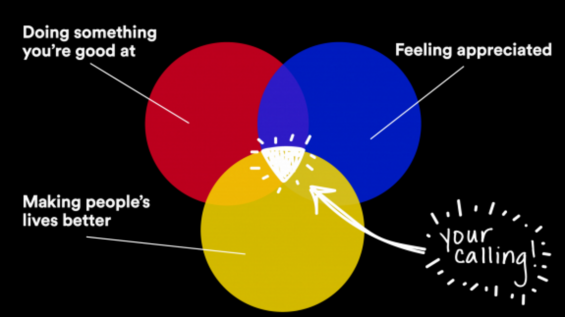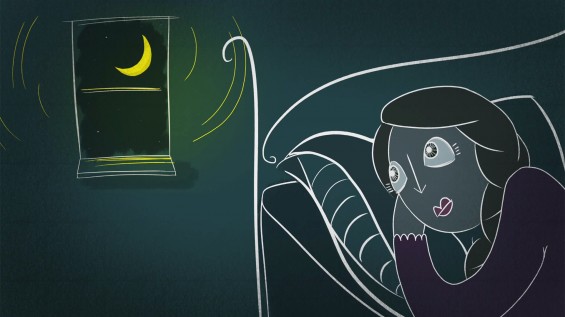
7 ideas about finding the work you were meant to do

You don’t “find your calling,” you fight for it — and other lessons from people who found their passion (sometimes late in life).
Whether it was during a career aptitude test or in a heart-to-heart chat, chances are someone has talked to you about how to “find your calling.” It’s one of those phrases people toss about. But StoryCorps founder Dave Isay takes issue with it … specifically, the verb. “Finding your calling — it’s not passive,” he says. “When people have found their calling, they’ve made tough decisions and sacrifices in order to do the work they were meant to do.” In other words, you don’t just “find” your calling — you have to fight for it. And it’s worth the fight. “People who’ve found their calling have a fire about them,” says Isay, the winner of the 2015 TED Prize. “They’re the people who are dying to get up in the morning and go do their work.” Over a decade of listening to StoryCorps interviews, Isay noticed that people often share the story of how they discovered their calling — and now, he’s collected dozens of great stories on the subject into a new book, Callings: The Purpose and Passion of Work. Below, he shares 7 takeaways from the hard-won fight to find the work you love.
1. Your calling is at the intersection of a Venn diagram of three things: doing something you’re good at, feeling appreciated, and believing your work is making people’s lives better. “When those three things line up, it’s like lightning,” Isay says. He doesn’t suggest that a person has to be a surgeon saving lives to feel like they have a calling; think of the diner waitress who talks to customers and makes them feel loved. How do you find this overlap? “You have to shut out all the chatter of what your friends are telling you to do, what your parents are telling you to do, what society is telling you to do,” Isay says, “and just go to that quiet place inside you that knows the truth.”
2. Your calling often comes out of difficult experiences. What lurks in that quiet place will be a defining experience — quite possibly a painful one. Isay points to an interview in Callings with 24-year-old teacher Ayodeji Ogunniyi. “He was studying to be a doctor when his father was murdered. He realized that what he was really meant to do was be a teacher,” says Isay. “He says that every time he walks into a classroom, his father is walking in with him.” This theme of people turning their hardest experiences into a new path runs throughout the book. “Having an experience that really shakes you and reminds you of your mortality can be a very clarifying event in people’s lives. Oftentimes, it leads to changes,” he says. “We spend a lot of time working, so it can really change your priorities in terms of work life.”
3. Calling often takes courage and ruffles feathers. Elsewhere in Callings, we hear about Wendell Scott, who became the first African-American NASCAR driver in 1952, and kept on driving despite threats against his life. From scientist Dorothy Warburton who dealt with extreme sexism as she conducted research to break the stigma around miscarriage. From Burnell Cotlon, who opened the first grocery store in the Lower 9th Ward after Hurricane Katrina because he wasn’t about to let his old neighborhood’s spirit fade. Calling, says Isay, very often starts with taking a stand against a status quo that simply isn’t acceptable, and then dedicating your work to changing it: “It’s work ignited by hope, love, or defiance — and stoked by purpose and persistence.”
4. Other people often nudge you toward your calling. Sharon Long had worked odd jobs most of her life. As Isay tells it, “Her daughter was going to college, and as the bursar was helping them with financial aid forms, she said quietly to herself, ‘I wish I could’ve gone to college.’ The bursar responded, ‘It’s not too late.’” Sharon enrolled in an art program, and on her advisor’s suggestion, took forensic anthropology as her science. “The advisor suggested it for no other reason than he thought it was the easiest science course for the science requirement,” says Isay. “But the minute she sat in that class, it was boom — this is what she was meant to do.” Isay tells this story to illustrate how calling, while very personal, is also relational. “People bump you this way and that way,” he says, often without realizing it. “When people find their callings, they want to honor those people who helped them get there.”
5. What comes after identifying your calling is what really matters. The old ‘finding your calling’ phraseology makes it sound like a calling is a pot of gold at the end of the rainbow — you find it, and the story’s over. But Isay stresses that your calling is an ongoing process. “Understanding what your calling is — that’s very different than the blood, sweat and tears of actually doing it,” he says. Pursuing a calling may require going back to school or apprenticing; it may require starting a business. Often, notes Isay, it leads a person into a line of work that’s in service of others. “This book is basically a love letter to nurses, teachers, social workers — the people who don’t often get celebrated for the work they do,” he says.
6. Age is irrelevant. Isay found his calling when he was 21 and interviewed a man who’d been part of the Stonewall riots. “The minute I hit record, I knew that being a journalist and interviewing people was what I was going to do for the rest of my life,” he says. “I feel very lucky that lightning struck when I was very young.” But collecting stories for the book reminded him that a calling can be discovered at any age. The book includes an interview with someone who knew they wanted to be an NBA referee at age 15, and another who worked as an accountant for 30 years before discovering his passion for slicing lox. “Doing the work you’re meant to do is one of the most satisfying, remarkable experiences that a person can have,” says Isay, “so never give up.”
7. Calling often doesn’t come with a big paycheck. Another trend Isay sees in stories of people who find their calling: they often involve leaving a high-paying job for one that’s lower-paying but more satisfying. “The message we send to young people is that you want to do as little work as you can to make as much money as you can — that’s the dream,” says Isay. “But the wisdom in the StoryCorps archive is that there’s another, much more rewarding dream of taking risks and working very hard to live with integrity.” In the end, that’s the lesson he took away from writing this book. “There are no millionaires, no billionaires, no celebrities, nobody with a big Twitter following,” he says. “Just stories that can teach us a lot about lives fully lived.”
This article first appeared on Ideas.ted.com. To learn more about StoryCorps and the TED Prize, watch this TED-Ed Original video.
Featured image: Emily Pidgeon/TED



Interesting post. Why is there not a share button for LinkedIn but there is for FB, Twitter and Email option? Seems like Ted would be right up LinkedIn’s street in terms of content.
I couldn’t agree more.
Thanks.
I find the last paragraph (point #7) disappointing. Why? Because it erroneously correlates ‘finding your calling’ with ‘increasing wealth’. Increasing wealth and an individual’s financial state is far more about the priority and financial choices and decisions a person makes – of which, your day to day job is one – but not solely about your day to day! You can find your calling, start a non profit organization, and make very smart self-budgeting and investment decisions to result in making you a millionaire. You can become a lawyer – maybe not your calling, work in a high end firm, earn half a million a year, and still be in debt!
It’s disappointing that the writer dampens the tone of this piece – which started off very uplifting – by stating that one who follows their calling should not expect much in return financially, when in fact, that has nothing to do with financial gain. And it continues to show an alarming disconnect we all have with work – money – wealth – and perspective. If you can find your calling and you don’t have to be ‘poor’.
powerful post! many thanks! =D ♥
I enjoyed reading this post. It was thought provoking to a level of committing to a “true ” self assessment of myself. We all have a purpose and calling upon our lives. It is revealed at different crossroads on this journey of life via the choices we make and the values we hold close to our heart. Now, when it is all over. The question will be, “were you satisfied with your life? Did you encourage others along the way with the amount of monetary means you’ve possessed? Hmm, it is my goal in life to do for as many people as I can with the amount of money I’m blessed to have stewardship. Whether it is small or great, I know that it will be more than enough to take care of the needs of my family and others. Why? because we have the power within to win!
One thing we could add is another way to identify your call. Listening to your feelings: which situation gives you a big emotion ? When you read a book, listen to a story, See a movie, are there stories that make your eyes wet? That could be a clue.
Tedd thanks for tips. Really nice post, you should write more about yor ideas. Thanks!
great observation and comment! well said. Kanika
I thoroughly enjoyed this article and appreciate the highlight that there is a “calling” for everyone. The fact that it often takes extra courage to pursue makes it all the more rewarding to attain. The ultimate reward is knowing you are fulfilling your God-given mission on this Earth.
Glad it described the benefits of the overlap.
I just wish there was something discussed about what to do when two of the circles don’t appear to overlap, or when the “calling” is non-sustainable (ie. doesn’t earn someone enough money to stay alive).
That Venn diagram is missing a “you enjoy doing it” section. Just because you’re good at something, doesn’t mean you like doing it
Feeling appreciated* that’s the point!
Agree. I am good at several things that I don’t enjoy. I could care less of it is appreciated by others. My self-worth doesn’t come from what others think.
Could it also be stated that many get distracted in effort to be someone/something other than thier truest self? Consequently losing the sense of their calling? My observation would also suggest the culture one resides in leaves few propositions to be authentic but rather formed into another’s idea of you and your calling.
Nice post. Thank you.
Nice to read. Life can be very interesting when this calling happens. Some people are lucky to find it by chance. I wish everyone could see their calling to make the life enjoyable. You can make others happy only when you are happy.
I can help heal man and help land bring peace
I would love someone to write this article again but with a view to an audience of 17 year olds. Just twist it to think this is a life a bit less lived and with less self knowledge but if you ramped up the references to opening up experiences, talking to your friends, tapping into your emotions…..
Ok I won’t say it’s Bull**** because it would be a simple short-cut. I would just say it’s a narrow minded vision of career path that could lead people to think that there are ” wrong ” ways and THE “right ” way to lead your career and your life …
Unfortunately life is much more complex than that :/ …
- There is no job where you can’t be good at if you don’t fight to become ( without this fight this job would be boring though )
- There is no job where you can’t feel appreciated ( or not) simply because working is a social experience… so if you don’t like yourself …. ( you get the point )
)
- There is no job that is meant to destroy lives … The concept of working is bring value to the society ( big debate I know but think about it and you’ll figure it out… )
- There are thousands of other points but on top of everything wealth and work are NOT RELATED ! Again a long debate but let’s take an example comparing 2 men who want to wash dishes for a living because they feel rewarded in that job and they know it brings value to people , it’s their calling bla bla ..
The first one works in a restaurant and he washes 100 plates a day and the second owns the top dishwasher brand in the world and he ( and the people he works with) washes 1Bio plates a day …
They both feel good at it , they feel appreciated and they make people life better buy their impact on society is slightly different
Wealth is about risk and ownership
So to conclude I would say that everything in your career can make you feel appreciated or not , good or not , usefull or not and broke or not …
Your vision , your knowledge and your drive will make the diference in your choices and will make you see opportunities and threats to reach your goal
you will know your calling when you do it effortlessly and others don’t do it as better as you do…
you will feel that you are in your element whenever you’re in the right track.
those who have a calling to do something that earns less money needs our help, the peace keepers, the story tellers, the lowly farmers.. if they don’t do what they needed to do, there will be no balance in life.
I was reading it and thinking about my calling. I am cherishing a dream from childhood to become a teacher but never planned to be one so early, when I became a teacher I found myself in the midst of love, happiness and innocence. But all on a sudden I left my job six months back. I wish I could start again.
Thanks for the article
I’m not so sure about that “feeling appreciated” part. How do you get to feel appreciated if people don’t really value what you do? You mentioned teachers and nurses who are rarely celebrated. I would think that other people appreciating you can’t be a part of your calling. You have to do it despite not being appreciated.
I really needed this…still not sure of what my calling is, but I remain hopeful. Thanks!
Great article…
Ted, I really needed to read this.